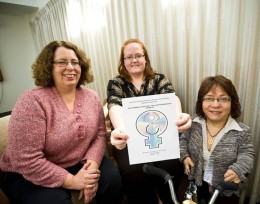
From left, Kathleen Malloy, Jennica Karpinski and Julie Williams are coordinating the Association of Women in Psychology conference March 6–9 in Columbus.
This year’s national Association of Women in Psychology conference—expected to draw at least 400 professional psychologists and others from around the country—is going to be a Wright State University production.
Coordinators for the event are Wright State School of Professional Psychology faculty members Kathleen Malloy, Ph.D., professor, and Julie Williams, Psy.D., associate professor and rehabilitation psychologist. Wright State alumna Jennica Karpinski, Psy.D., a staff psychologist at the University of Dayton Counseling Center, is also a coordinator.
In addition, all of the program chairs, committee chairs and most of those involved in putting on the conference are from Wright State.
Malloy went to the association’s national officers and volunteered Wright State to put on the conference, which will be held March 6 to March 9 in Columbus.
For the first time, the conference will focus on disability, with the theme: “The Personal is Political: The Lived Experience of Disability.” The four-day event will revolve around how disability impacts issues that many women navigate and include presentations on women’s mental health through the lens of feminist psychology.
Williams expects the conference to promote disability as an identity variable.
“I think of disability as a social justice issue; it’s largely treated as a medical issue,” she said. “I want to get away from that.”
Rhoda Olkin, executive director of the Institute on Disability and Health Psychology at Alliant International University in San Francisco, will be a keynote speaker at the conference.
“She has been a champion of disability-affirming therapy, disability-inclusive psychology issues,” Williams said. “She has been challenging psychology as a profession to promote competence around disability in its delivery of services.”
Another keynote speaker will be Nancy Smith, director of the Vera Institute of Justice’s Center on Victimization and Safety. Erin Andrews, Psy.D., a Wright State graduate and rehabilitation neuropsychologist at Central Texas VA Health Care System, will speak about reproductive rights for women with disabilities.
There will be workshops that cover disability, disability in popular media, disability rights around death and dying, racism, violence against women and feminist psychology studies.
Malloy hopes to end the conference with an action agenda that will result in the publication of scientific papers and possibly a book.
“I would like to see disability be seen as a social justice issue, to be looking at how the larger cultural context impacts people with disabilities,” she said.
The Association of Women in Psychology is a national scientific and educational organization committed to encouraging feminist psychological research, activism and intervention.
Karpinski says the organization is key because it promotes a different way of thinking that challenges the status quo.
“It is advocacy for practitioners of psychology as well as the clients they work with and people in society in general,” she said. “It challenges harmful stereotypes or beliefs and tries to subvert them.”
Williams is optimistic about the outcome of the conference.
“I hope people walk away understanding that women with disabilities have a voice, that their voices are strong and proud, and perhaps, most importantly, that we make the world a better place,” she said.

 Wright State to help local teachers build knowledge of STEM fields
Wright State to help local teachers build knowledge of STEM fields  Wright State business graduate serving in diplomatic post-Gulf War humanitarian mission
Wright State business graduate serving in diplomatic post-Gulf War humanitarian mission  Wright State alum Brittany Shyne wins top documentary prize at Sundance Film Festival
Wright State alum Brittany Shyne wins top documentary prize at Sundance Film Festival  Wright State Theatre presents Shakespeare’s comedy ‘Much Ado About Nothing’ Feb. 14–23
Wright State Theatre presents Shakespeare’s comedy ‘Much Ado About Nothing’ Feb. 14–23  Wright State’s spring Career Fair and new Career Hub are perfect fit for students and employers
Wright State’s spring Career Fair and new Career Hub are perfect fit for students and employers 